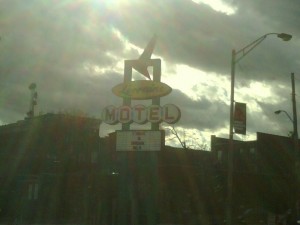Last weekend I found myself at the Lorraine Motel. Memphis is a town haunted by racism, like most of the South. Like most of the US. It suffers from a legacy of pain and suffering. The cost has been so high for this struggle for justice.
In case this doesn’t ring a bell for you, the Lorraine Motel is where Martin Luther King, Jr. was shot and killed in 1968. Most of the motel has been converted and is now home to the National Civil Rights Museum.
I felt absolutely drained by the time I walked through the exhibits. Watching film footage of white people, grown people mind you, harassing black students sitting at lunch counters, or making such stunning statements in support of segregation, well it pretty much just put me under. It happened less than fifty years ago.
It still happens. More subtle are the harassments, but injustice and inequality remain. Too many of my white sisters and brothers remain blissfully ignorant of their place in it. I, too, fail often to see the problems and I miss something important.
Plenty of people who lived through the Civil Rights Movement of the 1950s and 60s and 70s are still living. Their stories are personally and politically powerful. I heard some of those personal stories while I was in Memphis.
Nobody really wants to think back to this time, what with this week’s snow and sledding and hot chocolate on the one hand, and with another mass shooting, and a cholera epidemic in Haiti on the other. Who has time for thinking back to a civil rights struggle nearly 50 years ago?
If you look carefully at the Motel sign, you can see the message on it is from Martin Luther King, Jr. It is the title of his most famous speech, “I Have a Dream.”
The dream is not yet fulfilled. Too many white folks still live in the privilege and luxury of ignorance about our role in racial injustice in this country. We go on sipping our hot chocolate and not noticing anything is wrong. We think the problems are not ours, yet a lot of young white men keep pulling guns out and shooting people randomly. And we call these moments anomalies.* We don’t seem to connect the dots between the numerous shootings, or ask: how is it that white culture might be contributing to this behavior? Of course there are other factors like mental illness. Yet we are also implicated in this by our loss of community that fails to notice when someone is going off the rails. And we don’t seem to notice how many other places in the world are also suffering as a result of racism. Like Haiti, where the history of oppressions and injustices is long and daunting.
It might sound like I’m trying to induce guilt. But that is not really my point. It is a stage of recognizing the problems. But I’m with Tim Wise on this one. If we are going to move forward rather than be bogged down in feeling bad about the conditions in which we find ourselves, then we need responsibility. Not guilt. We need to notice our anger and make a commitment to help make a change, not wallow in bad feelings. He makes a comparison between addressing the problems of pollution and addressing the problems of racism. His point is simple and compelling. We don’t need to spend time feeling guilty for the problem, we need to join our energy to helping overcome it.
Martin Luther King, Jr. said he had a dream. One hundred years after slaves had been proclaimed free, still oppression, segregation and exile remained. He invited others, me and you, to “refuse to see the bank of justice as bankrupt.” He invites us to see a vision of equality and to dream that dream with him.
As we approach the MLK holiday, “now is the time” to move forth, to own our responsibility for doing something new. We must “not be satisfied until justice rolls down like waters and righteousness like a mighty stream.”
Looking back. Looking forward. What will you do?
- Tim Wise has written a very compelling argument that white folks remain in denial about the “profile” of young white men who take up arms against their own communities.




